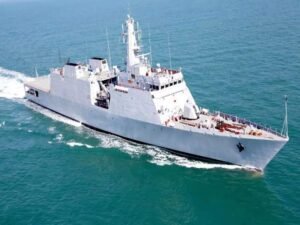A dramatic rescue operation unfolded when the INS Sumedha intercepted the hijacked vessel FV AI-Kambar which led to the surrender of the Somalian pirates. This event took place in the early hours of 29th March.
They were further joined by the guided missile frigate INS Trishul. In this 12-hour operation, the navy ensured to use all their tactical expertise and coordination and start their negotiations with the pirates.
The Navy successfully ensured that the pirates surrendered without any bloodshed therefore saving all 23-person Pakistani crew onboard the vessel.
The Indian Navy addressing the incident informed the press that specialist teams are presently undertaking thorough sanitation and performing checks to escort the vessel to a safe area so that they can resume with their fishing operations.
Increasing Maritime piracy attacks
The attacks of pirates have been increasing in recent times.
Some months ago, a ship was hijacked near Somalia fueling fear in the trade industry. Such attacks have been increasing.
A week ago, the Indian navy recaptured a ship which was hijacked by the Somalian pirates 3 months ago. In the rescue operation, the navy ensured to save all 17 crew members and forced the 35 pirates to surrender.
These kinds of attacks are becoming more prevalent and a threat to safe transport and trade in the world.
Indian Navy’s fight against piracy
The Indian navy has been at the forefront of this fight to ensure no threat is present for any vessel in India’s neighbourhood. The Navy started Operation Sankalp to increase security in the seas.
“Operation Sankalp has broken the myth of short and swift operations and stressed the need for sustained operations to ensure safety and stability in the oceans. The pace of operations is quite high, and we have 11 submarines and 30 warships operating in different parts of the ocean to ensure coverage of all areas of interest” – Admiral Hari Kumar (current chief of Naval Staff)
The chief also mentioned the presence of warships in the region for anti-piracy, anti-missile and anti-drone operations under these operations.
India also deployed 2 warships to the Arabian Sea after a tanker was attacked near Gujarat.
He also referred to the attack of Houthi rebels on the UK, US, and Israeli ships. This attack was not on the Indian vessels. The reason for the Indian navy’s involvement was the Indian crew present. Now the Navy has made sure that no illegal activity will take place and the rescue of Pakistani crew tells a lot about their motive for saving people in spite of their nationality.
Impact on Businesses
 The route from the Arabian Sea like the trade from the Gulf of Aden is among the main routes of trade with the highest amount of traffic. Any disturbances on these routes can impact the trade all around the world costing billions of dollars.
The route from the Arabian Sea like the trade from the Gulf of Aden is among the main routes of trade with the highest amount of traffic. Any disturbances on these routes can impact the trade all around the world costing billions of dollars.
Imagining that the route doesn’t work, the ships would have to take the alternative route adding 12-14 days of sailing time. This would increase the freight costs by 30-40% passing the burden to prices of goods traded.
The Red Sea accounts for roughly one-third of the containerized cargo. When the Houthi rebel group launched an attack on the Red Sea in the past, many trading companies seized operations in that area and changed routes. Thus, they would have to bear the cost of increased sailing time making goods costlier.
The products having shorter life are at a higher risk due to the high perishability of the goods. The impact on India can be significant as the long-distance trade with the US and Europe can have a huge impact and affect products like capital goods, machinery, vehicles, pharmacy, etc.
.











